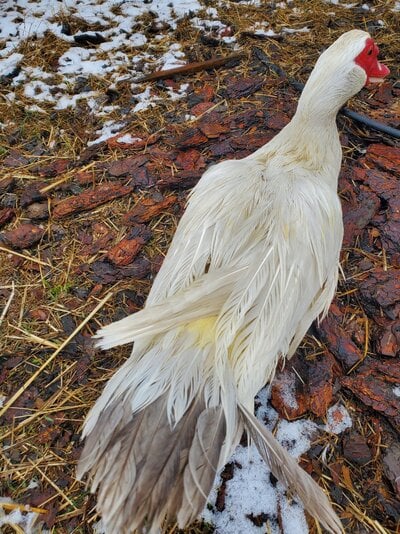So I'm relatively new to ducks and still learning. I have 7 muscovies. Four since they were ducklings and 3 I got at 3 months old. They are all 7 months old now. My 3 girls from a separate flock are all doing great. My 4 originals are all developing wet feather. This is my drake Jack, he is by far the worst.
I have read quite a bit about what can cause it and how to treat it.
All of my birds bathe at least every other day. So far none of them are water shy. They do preen, but I do notice that they don't rub their oil gland as much as maybe they should.
They are free range and have good nutrition.
Today I brought in both of my girls and bathed them and blow dried them. They did not get dry even remotely after 15mn. Their feathers just remained wet stuck together. I fluffed them and dried them as best I could and locked them up in the coop to preen.
I checked both of their oil glands. They were not swollen or red at all. The one had very yellow feathers around the gland, the other did not have very yellow feathers. They both did not appear to be producing much oil, but I did get oil on my fingers while doing the exam.
My question is, has anyone successful treated wet feather when it has gotten as bad as the duck in the photo?
I hesitate to bring this guy in and drown er bathe him. My girls did ok, much to my surprise. But they made a huge wet mess in the bathroom. This guy, I can't even imagine....
I'm willing to try, but I really want to know if anyone has been able to reverse or even help a case this severe. Or any case at all. It is wet and muddy season here. I can't keep these birds contained all day they might kill each other. But it makes me so sad to see them slipping into this condition.
Any helpful advice is appreciated.
I have read quite a bit about what can cause it and how to treat it.
All of my birds bathe at least every other day. So far none of them are water shy. They do preen, but I do notice that they don't rub their oil gland as much as maybe they should.
They are free range and have good nutrition.
Today I brought in both of my girls and bathed them and blow dried them. They did not get dry even remotely after 15mn. Their feathers just remained wet stuck together. I fluffed them and dried them as best I could and locked them up in the coop to preen.
I checked both of their oil glands. They were not swollen or red at all. The one had very yellow feathers around the gland, the other did not have very yellow feathers. They both did not appear to be producing much oil, but I did get oil on my fingers while doing the exam.
My question is, has anyone successful treated wet feather when it has gotten as bad as the duck in the photo?
I hesitate to bring this guy in and drown er bathe him. My girls did ok, much to my surprise. But they made a huge wet mess in the bathroom. This guy, I can't even imagine....
I'm willing to try, but I really want to know if anyone has been able to reverse or even help a case this severe. Or any case at all. It is wet and muddy season here. I can't keep these birds contained all day they might kill each other. But it makes me so sad to see them slipping into this condition.
Any helpful advice is appreciated.





